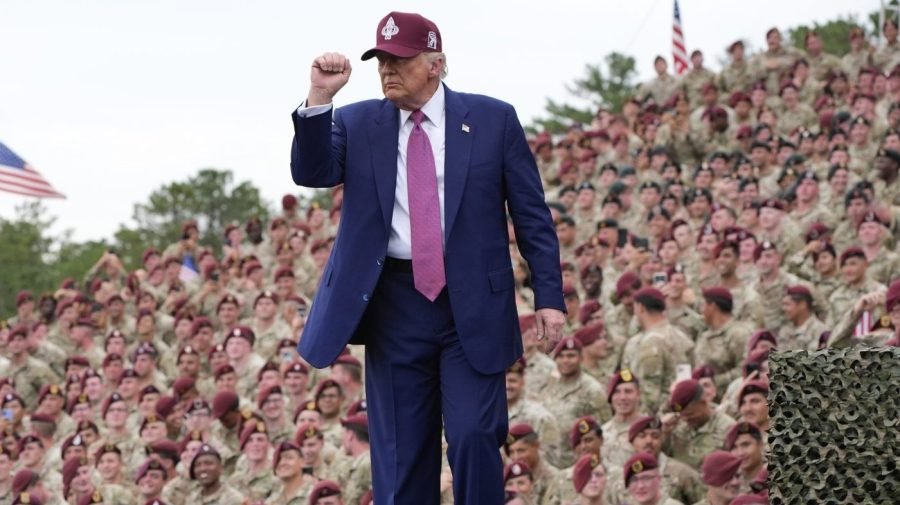
As former military judge advocates, we worked at the intersection of lethality, lawfulness and obedience — three pillars that support any effective military force.
Over the last six months, a campaign to dismantle these pillars has begun. Its apparent objective is to subordinate our national defense to the personal, political and social agendas of a commander-in-chief who prizes personal loyalty above the military’s commitment to our nation and Constitution. If it continues, our military will become less effective in defending us from external threats — and may become a tool of domestic coercion.
Secretary of Defense Pete Hegseth launched the campaign when he dismissed the Army and Air Force Judge Advocates General. His rationale that this was necessary to promote a “warrior ethos” was thin cover for his belief that military lawyers are obstacles to victory on the battlefield. In fact, history teaches that without adherence to the rule of law, a military will lose legitimacy, forfeit popular support and ultimately suffer defeat.
Hegseth then fired the chairman of the Joint Chiefs of Staff, the chief of Naval Operations and vice chief of staff of the Air Force because he considered them products or promoters of diversity, equity and inclusion policies. His message that Black or female officers will no longer lead at senior levels raises fears that future senior officer appointments will be based on personal loyalty, political ideology or “acceptable” demographics, not experience or statutory qualifications. Militaries filled with “yes men” do not win wars.
Following this one-two punch, President Trump next unleashed a “shock and awe” torrent of orders clearly designed to bend the military away from the Constitution toward personal loyalty.
In April, Trump skirted the Posse Comitatus Act’s prohibition against using federal military forces to enforce domestic laws by establishing the first of several National Defense Areas along the southern U.S. border. The declaration allows non-military areas to be treated as if they were military installations so that military personnel can enforce domestic law.
In June, Trump again side-stepped Posse Comitatus by deploying 4,000 National Guard troops and 700 Marines to Los Angeles to “protect federal agents and property” during what he described as violent protests. (A federal judge ruled this week that the deployments were illegal.)
That same month, the president visited Fort Bragg, N.C., to celebrate the Army’s 250th anniversary. He turned the event into a political rally by inciting troops — in uniform and prescreened for anti-Trump political views and looks — to support his partisan comments.
Last month, Trump activated the D.C. National Guard, ostensibly to fight “out of control” crime. Because D.C.’s 2024 crime rates were at a 30-year low and the 2025 rates are even lower, many believe that “crime control” was pretext to rehearse the military occupation he is planning for other “blue cities.”
Thus far, no effective opposition has emerged to constrain the president’s domestic use of the military. Not only have Congress and the judiciary been impotent, in some cases they have been complicit. For example, in Trump v. U.S., the Supreme Court granted presidents immunity for crimes committed while performing the duties of commander-in-chief.
Clearly, more mischief is possible. Only a concerted effort to reenergize the checks and balances our Founders established can reverse our current path.
Congress can still act to restore the stature, enforcement and independence of military law. It can also prevent the Pentagon from spending money on domestic missions.
Governors must insist that their National Guard units not be used outside their states for domestic law enforcement or for political or personal purposes. Gov. Phil Scott’s (R) refusal to mobilize the Vermont National Guard to support federal law enforcement activities is a courageous example.
Senior military leaders should communicate to their troops that adherence to the law is an essential element of military effectiveness by insisting that all orders must be lawful and that “lethality” must not be its only measure. It certainly is not the right metric for how troops should treat their fellow citizens.
Finally, the public can do much more to demand that our armed forces must be both lawful and lethal. Americans must understand and express support for the principle that military obedience is owed to the Constitution, not to any individual.
Eugene R. Fidell is a senior research scholar at Yale Law School, where he teaches military justice. Rear Adm. (Ret.) William D. Baumgartner served for 33 years in the U.S. Coast Guard. Maj. Gen. (Ret.) Steven J. Lepper served for 35 years as an Air Force judge advocate.

